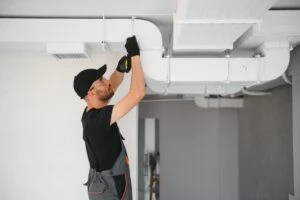
The investment in new heating and cooling equipment in your home offers a wide range of product options, but it is critical to compare all products carefully to find those best suited for your needs. Is a high SEER rating important for your home’s HVAC?
A higher SEER rating can be important because it means the system is more efficient and has the potential to lower your overall heating and cooling costs, so talk to a technician from a reputable AC repair in Las Vegas, NV, company today.
Explaining What a SEER Rating Means
When choosing a heat pump, air conditioner, or other component of your HVAC system, the SEER rating is one of several factors that affect the overall efficiency and performance of the system with the help of an AC repair in Las Vegas, NV, company.
Seasonal Energy Efficiency Ratio, or SEER, is a measurement that determines just how energy efficient your system is and how effectively it converts electricity into cooling power for your AC unit. In short, a higher SEER rating means your system is likely to be more efficient than a system with a lower rating.
On the scientific side, SEER is a rating that shows how efficient your system is. To calculate this rating, the manufacturer divides the system’s cooling output during a typical cooling season by the overall power input. The output is measured in British Thermal Units (BTUs).
Whether you find it on your air conditioner, heat pump, or other system component, the data comes from the manufacturer, and it is typically shared on the Energy Guide label.
When purchasing a new system, you will certainly want to compare this rating with other factors about the unit to determine which is best suited for your needs.
can also trust our team at Ambient Edge to help you make your decision.
How to Compare HVAC Systems by SEER Ratings
If you are in the market to purchase a new HVAC system, including a new air conditioner, you will want to consider numerous factors related to its functionality and features.
One of those factors is the SEER rating. Both the SEER and the Energy Efficiency Ratio (EER) are factors to learn about before choosing a system.
While SEER demonstrates the system’s cooling output divided by its power consumption over the season, EER is a bit different. It measures the system’s instantaneous efficiency, not its energy efficiency savings over the entire system.
If you are buying a window air conditioning unit, you will only find an EER rating. Most central air conditioning systems, comparatively, have both an EER and a SEER rating. Use this information to compare options carefully among the brands you are considering purchasing.
Knowing the Standards for Central Air Conditioners
Starting in 2006, the EPA (Guide to Home Heating and Cooling) required all residential air conditioners in the country to have a SEER rating of at least 13.
However, to be an ENERGY STAR-qualified system, the SEER rating must be at least 14. Many people wonder, though, whether it is worth upgrading from a lower SEER rating to a higher one.
It definitely can be worth it when comparing your options in an HVAC system. All other factors are equal; converting, for example, from a SEER 9 to a SEER 14 system means you would be reducing your energy consumption by about 35% overall. The EPA shares that is about $35 on a $100 heating bill each month.
Considerations for Heat Pumps and SEER Rating
If you are using a heat pump or upgrading to a new one, you should also consider your options in terms of a high SEER rating, which is important for your home’s HVAC. Air-source heat pumps combine heating and cooling abilities, and it is worth looking for a system with at least a SEER 14 rating.
Also, note the Heating Seasonal Performance Factor (HSPF) of the heat pump, which is the ratio of the total heat output of the heat pump during the normal heating season divided by the total energy consumed.
Heat pumps can be ENERGY STAR qualified if they have an HSPF that is at least an 8 rating or higher. Always learn what this factor is before you invest in any type of heat pump for your home.
Let the team at Ambient Edge help you determine which system is ideal for your needs. In the long term, a heat pump needs to be comprehensively beneficial during both the warm and cold seasons, and choosing the right model to achieve this can be critical to achieving energy savings.
Our team can help you consider all of your options when learning what EER, IEER, SEER, IPLV, and HSPF mean.
When to Invest in a New Heating and Cooling System
It is a big decision to invest in a new HVAC system. You do not have to do this on your own without guidance. Our team at Ambient Edge can offer you the guidance you need throughout this process in several ways.
- We will determine what specific type of system is best suited for your home and make sure that upgrading now is really worth it for your home.
- Our team will then explore various options with you to determine how to get the best price and the highest SEER rating to make it worth your money.
- Let our team help you get the best price not only for your new system but also for the overall installation of the system as well.
Take a moment to give us a call. Let our professionals offer you the options you need to improve your home’s heating and cooling system. We are happy to offer you a free quote and provide you with answers to your frequently asked questions.
Schedule a Free Quote for a New System with Our Team
If you are looking for options in a new HVAC system, you need a team you can rely on. Contact Ambient Edge and let us help you find the best SEER rating for your HVAC system.
Talk to our team today about your HVAC needs in Las Vegas and beyond and whether or not a high SEER rating is important for your home’s HVAC.


